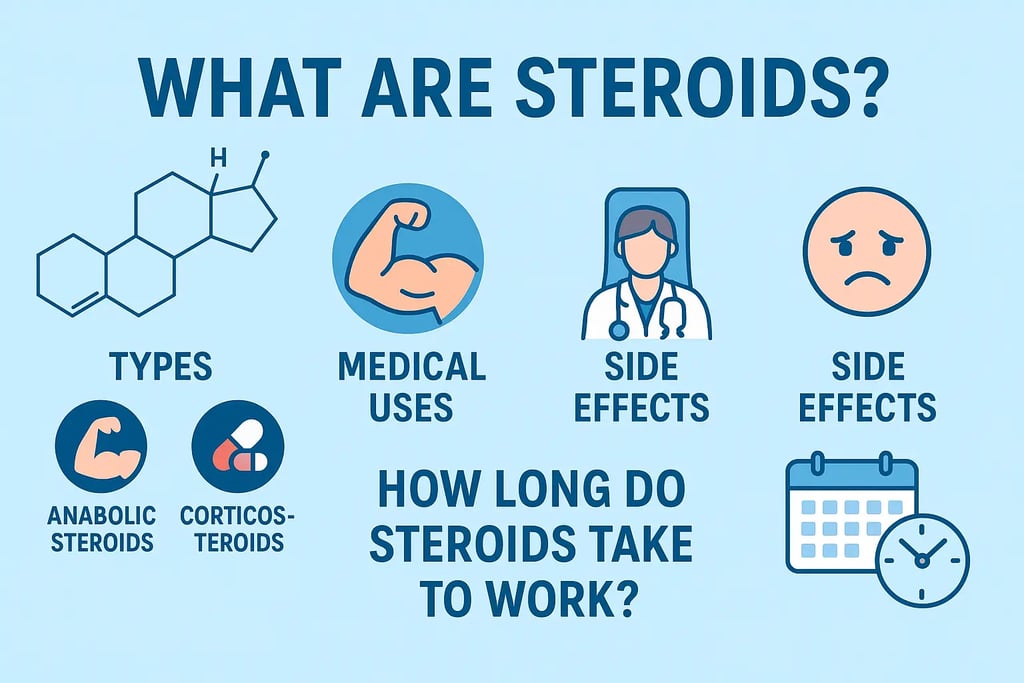What Are Steroids? Types, Medical Uses, Side Effects & How They Work
Learn what steroids are, their types (anabolic and corticosteroids), medical uses, benefits, side effects, and how long they take to work. Discover safe and informed steroid use.


🧬 Understanding Steroids: Types, Uses, Benefits, and Side Effects
What Are Steroids?
Steroids are a class of organic compounds characterized by a unique four-ring molecular structure. They play vital roles in numerous biological processes and are broadly categorized based on their functions and chemical composition. The two primary types of steroids are anabolic steroids and corticosteroids, each serving distinct purposes in medicine and performance enhancement.
Anabolic steroids (anabolic-androgenic steroids or AAS) are synthetic derivatives of testosterone, the natural male hormone responsible for muscle growth and strength. These steroids are used medically to treat hormonal imbalances and muscle loss but are often misused by athletes to enhance physical performance and build muscle mass. However, their non-medical use can lead to serious health risks and legal consequences.
Corticosteroids, on the other hand, are derived from cortisol, a hormone produced by the adrenal glands. They are primarily used for their anti-inflammatory and immunosuppressive effects, making them essential in the treatment of asthma, arthritis, allergies, and autoimmune diseases.
Steroids are available in different forms, including:
💊 Oral steroids – convenient but may affect liver health with long-term use.
💉 Injectable steroids – deliver a sustained release directly into the bloodstream.
🧴 Topical steroids – used to treat skin conditions like eczema and psoriasis.
Understanding these forms helps individuals make informed decisions about their steroid use, whether for medical treatment or performance enhancement.
💊 Medical Uses of Steroids
Steroids, especially corticosteroids and anabolic steroids, have several important medical applications beyond sports and bodybuilding.
Corticosteroids replicate the effects of hormones naturally produced by the adrenal glands. They are widely prescribed to:
Reduce inflammation in chronic conditions like asthma and arthritis
Alleviate symptoms of autoimmune disorders such as lupus
Manage skin allergies and respiratory issues
Anabolic steroids, though often controversial, have legitimate medical purposes. Doctors may prescribe them to:
Treat low testosterone levels in men
Support muscle recovery after injury or surgery
Address muscle wasting diseases such as HIV-related muscle loss
However, these medications must always be used under medical supervision. Unmonitored or prolonged use can lead to serious health complications.
⚠️ Side Effects of Steroid Use
While steroids offer significant benefits, misuse or overuse can result in severe side effects. These effects vary depending on the type of steroid and duration of use.
Common side effects of anabolic steroids include:
Mood swings, aggression, and “roid rage”
Hormonal imbalance, leading to infertility and testicular shrinkage in men
Virilization in women (deep voice, facial hair growth, menstrual changes)
Cardiovascular risks, such as high blood pressure and cholesterol levels
Liver toxicity with prolonged oral use
Corticosteroid side effects include:
Weight gain and fluid retention
Mood changes, anxiety, and insomnia
Increased risk of osteoporosis and diabetes
Adrenal gland suppression if stopped suddenly
Regular medical monitoring and dosage management are crucial to minimize these risks. Doctors often recommend periodic tests to ensure that steroids are not causing internal harm.
⏱ How Long Do Steroids Take to Work?
The timeframe for steroid effects depends on factors such as the type of steroid, method of administration, dosage, and individual health condition.
Anabolic steroids: Typically show noticeable effects—like increased strength and muscle mass—within 4 to 6 weeks of consistent use.
Corticosteroids: Often work faster, sometimes within a few hours to a few days, especially when treating inflammation or pain.
The method of administration also influences results:
Injectable steroids act faster and last longer.
Oral steroids work quickly but may strain the liver.
Topical steroids provide localized relief within a few days.
For chronic conditions, steroids may need to be used for extended periods under strict medical guidance to balance effectiveness and safety.
🧠 Final Thoughts
Steroids are powerful compounds that can heal or harm, depending on how they’re used. When prescribed and monitored by healthcare professionals, they provide immense medical benefits—from treating inflammation to restoring hormone balance. However, unsupervised or recreational use poses serious risks to both physical and mental health.
Before using any steroid, it’s essential to consult a medical professional, understand potential side effects, and follow prescribed doses responsibly. Knowledge and caution are key to maintaining long-term health and well-being.
